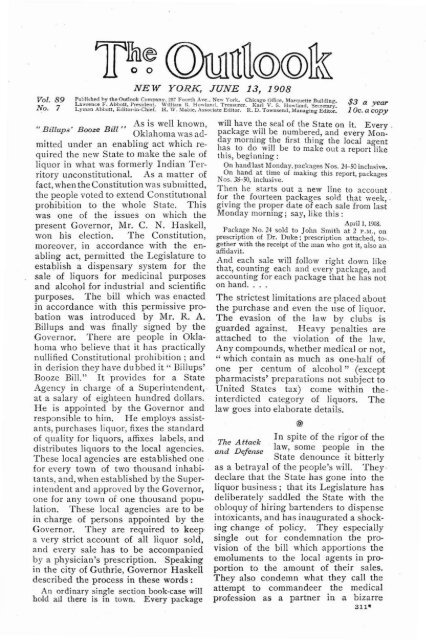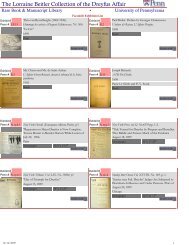The Dreyfus Infamy Again
The Dreyfus Infamy Again
The Dreyfus Infamy Again
Create successful ePaper yourself
Turn your PDF publications into a flip-book with our unique Google optimized e-Paper software.
NEW YORK, JUNE 13, 1908<br />
Vol. 89 ~~~~~~~~~ ~:b~tt.l~~~fe~rnrViI~:r~o:~~~~:,:.~;~~~Tr~~~~;er~h~~!1<br />
0 ~~s~·~~~~~ed~es~~~~~~: $3 a year<br />
No. 7 LyiR3.n Abbott, Ed,tor·Hl·Chlef. H. W. Mable, Associate Editor. R. D. Townsend, Managing Editor. 1 Oc. a copy<br />
".. . "<br />
BIllups Booze BIll<br />
As is well known,<br />
Oklahoma was adwill<br />
have the seal of the State on it. Every.<br />
package will be numbered, and every Monmitted<br />
under an enabling act which re- day morning .the first thing the local agent<br />
has to do wIll be to make out a report like<br />
quired the new State to make the sale of this, beginning:<br />
liquor in what was formerly Indian Ter- On hand last Monday,pac
314'" THE OUTLOOK 13 June<br />
referred to the people by the Legislature;<br />
four of them are legislative measures<br />
upon which the referendum has been<br />
ordered by petition of the people; the<br />
remaining eleven are laws or Constitutional<br />
amendments proposed by initiative<br />
petition of the people. Some of the<br />
latter deal with woman suffrage, the<br />
single tax, the recall of public officers,<br />
instructing members of the Legislature<br />
to vote for the people's choice for<br />
United States Senator, proportional representation,<br />
and a corrupt practices act.<br />
@<br />
<strong>The</strong> announcement that<br />
Cheap Ocean<br />
Postage a two-cent per ounce<br />
postal rate on letters<br />
between the United States and the<br />
United Kingdom will go into effect on<br />
October 1, 1908, caused cheering in the<br />
House of Commons on Wednesday, June<br />
3, and much unreported rejoicing in both<br />
countries. Ocean penny postage is no new<br />
thing. It has long existed between the<br />
United States and its insular possessions.<br />
International penny postage is nothing<br />
new. It has existed since 1875 between<br />
the United States and Canada, and now<br />
also with Mexico, Cuba, and Panama.<br />
Now for the first time two great world<br />
powers ag-ree to it as a strengthener of the<br />
ties already uniting them-an agreement<br />
prolific of others. France and Germany,<br />
for instance, are not likely long to lag<br />
behind Great Britain in such reciprocity<br />
-with us. More correspondence means<br />
more acquaintance, friendship, brotherhood.<br />
Last October letter postage for<br />
all countries in the International Postal<br />
Union was reduced from ten cents to five<br />
cents an ounce; the present reduction to·<br />
two cents anounce in the rate on letters to<br />
Great Britain thus makes a cut of eighty<br />
per cent within a year. It is within living<br />
experience that the earliest transatlantic<br />
steamers advertised the transmission of<br />
letters to England at a dollar apiece. A<br />
heavy tax lay upon the correspondence<br />
of our grandfathers. Before the present<br />
writer lie some letters between New<br />
England State5 during the first two decades<br />
of the last century, on which the<br />
local postmasters wrote the name of Jhe<br />
mailing office and the postage due from<br />
the addressee, as 12~ cents, or 18%<br />
cents. In 1816 a letter might go not<br />
over thirty miles for 6>:( cents. <strong>The</strong>se<br />
curiou~ fractions were due to the general<br />
cIrculatIOn of two small Spanish<br />
coins valued severally at 6>:( and 12Yz<br />
cents, the latter locally termed "York<br />
shilling," and valued at eigh.t for a dollar.<br />
<strong>The</strong> silver half-dime now supplanted<br />
by the nickel did not come into vogue<br />
until the introduction in 1845 of the fivecent<br />
rate on half-ounce letters going not<br />
over 300 miles. In 1816 a quadruple<br />
rate was laid on letters weighing an<br />
ounce or more. This for a letter goincy<br />
400 miles or more amounted to on~<br />
dollar. It took more than ten years of<br />
agitation to abate the heavy taxes on correspondence.<br />
Meanwhile private expresses<br />
carried large numbers of letters<br />
between the principal cities at lower<br />
rates. After 1845 this was illegal unless<br />
the letters bore postage stamps. In<br />
1851 the bottom rate dropped to three<br />
cents on half-ounce letters. In 1863<br />
this was made the uniform rate for all<br />
distances. In 188-3 the two-cent rate<br />
per ounce came in, and now a demand<br />
is already astir for one cent as the letterwriter's<br />
ideal. <strong>The</strong> two-cent ocean rate<br />
which now gladdens both shores of the<br />
Atlantic would doubtless have been<br />
sooner agreed to but for the different<br />
aims of the two Governments-the British<br />
aiming to make the postal service<br />
yield revenue, the American to make it<br />
pay expenses, both of which will in<br />
course of time be found compatible with<br />
the reduced tax on letters. <strong>The</strong> next<br />
step in advance in the United States will<br />
be, as it ought to be, the introduction of<br />
the Parcels Post and the Postal Savings<br />
Bank. Among the many who have promoted<br />
postal betterments during the<br />
seventy years since Rowland Hill, of<br />
England, and Edward Everett, of Massa·<br />
chusetts, the eminent efficiency of Henniker<br />
Heaton, M. P., together with that<br />
of our own Postmaster-General, Mr.<br />
Meyer, in securing this last great improvement<br />
deserves grateful recognition.<br />
@<br />
Paris has had an<br />
<strong>The</strong> <strong>Dreyfus</strong> <strong>Infamy</strong> other touch of the<br />
<strong>Again</strong><br />
Dreybs insanity,<br />
and a revival, which it is to be hoped is<br />
sporadic, of the <strong>Dreyfus</strong> infamy. <strong>The</strong><br />
proposal to transfer to the Pantheon the
1908 THE WEEK 315<br />
body of Zola, the novelist, and the servant<br />
and defender of French honor and<br />
righteousness by his courageous appeal<br />
for justice to <strong>Dreyfus</strong>, met with bitter<br />
and in some cases ridiculous opposition.<br />
One French gentleman, with a title which<br />
had been secured by a military adventurer<br />
of Napoleon's time, threatened to<br />
remove the remains of his grandfather<br />
from the Pantheon in order to protect<br />
them from contamination; and there<br />
were furious speeches and editorials, and<br />
a recrudescence of that shouting for the<br />
army which sickened the whole world<br />
when it was heard in court on the lips of<br />
dishonored French generals. <strong>The</strong> body<br />
of Zola was quietly taken to the Pantheon<br />
and public exercises were held in<br />
that great building on Thursday of last<br />
week. As the President of France, the<br />
Premier, and other Ministers were taking<br />
their departure at the close of the<br />
ceremonies, a military writer of some<br />
standing, Gregori by name, drew a revolver<br />
and fired two shots at Major<br />
<strong>Dreyfus</strong>, slightly injuring in the forearm<br />
the victim of race hate and military<br />
passion. <strong>The</strong> Pantheon was filled with<br />
men of distinction, and the reports of<br />
the shots caused intense excitement.<br />
For a moment everybody thought of the<br />
President. In an instant, however, the<br />
would-be assassin was surrounded by<br />
soldiers and protected from the fury of<br />
a crowd that probably would have made<br />
short work with him. 'Like everything<br />
connected with the persecution of <strong>Dreyfus</strong>,<br />
this attempted assassination was<br />
contemptible in its meanness; the first<br />
shot.was fired from behind <strong>Dreyfus</strong>'s<br />
back 1 Paris is now wondering what lies<br />
back of this attempt to end a man who<br />
had been tortured almost beyond the<br />
limits of human strength. Gregori is an<br />
Italian by parentage, but has long been an<br />
ardent Frenchman in his sympathies, has<br />
written with some knowledge on military<br />
topics, and has been in intimate relations<br />
with leading French officers. <strong>The</strong> question<br />
is whether he was merely an individual<br />
assassin, or whether he was the<br />
tool of a little group of Royalists who<br />
have never accepted the decision of the<br />
Court of Cassation and the reinstating<br />
of Major <strong>Dreyfus</strong>. <strong>The</strong> fire of race<br />
hatred, which was only smoldering, has<br />
been fed by the anti-Semitic papers ever<br />
since the Government decided to place<br />
the body of Zola in the Pantheon; and<br />
the meanness to which brilliant men<br />
can descend when race prejudice takes<br />
possession of them is brought out by<br />
Henri Rochefort's statement in an interview<br />
in which he says, "It would have<br />
been a glorious death for <strong>Dreyfus</strong>. It<br />
would have been his first and only time<br />
under fire." Gregori fired the first shot<br />
from behind <strong>Dreyfus</strong>. <strong>The</strong> bullet penetrated<br />
the sleeve of his coat and passed<br />
on, burying itself in a flower-pot at the<br />
base of the catafalque. <strong>Dreyfus</strong> turned<br />
at the sound and threw his left arm<br />
over his heart. <strong>The</strong> second shot was<br />
fired point blank at his breast. <strong>The</strong><br />
bullet entered the wrist and moved upward.<br />
<strong>Dreyfus</strong>'s brother Mathieu, who<br />
sprang forward to help him, with a<br />
chivalry to which his opponents are<br />
strangers, protected Gregori from the<br />
crowd who were beginning to pound him<br />
with canes and umbrellas, saying as he<br />
did so, "It is not for us to punish. Let<br />
the law take its course I" This extraordinary<br />
incident is in keeping with the<br />
whole tragedy, which has been one of<br />
contemptible baseness. <strong>The</strong> charges<br />
against <strong>Dreyfus</strong> fell to the ground; the<br />
men who brought them were proved to<br />
be scoundrels; the nation reversed its<br />
verdict; and yet <strong>Dreyfus</strong> receives a bullet<br />
while he is paying honor to a man<br />
whose only offense was that he heroically<br />
led France out of a slough of dishonor!<br />
@<br />
<strong>The</strong> secret of the sincere<br />
<strong>The</strong> President<br />
popularenthusiasm with<br />
of the<br />
which President Fallihes<br />
was received on<br />
French Republic<br />
his reeent official visit to England is<br />
revealed in a recent article in the Pall<br />
Mall Gazette, of London, which we find<br />
reprinted in the New York Evening Sun.<br />
This article, written by an Englishman,<br />
constitutes an intimate personal portrait<br />
of the French President, and discloses<br />
those genuine human qualities and that<br />
simple and straightforward spirit to<br />
which geographical boundaries, political<br />
barriers, and race prejudice are<br />
never permanent obstacles. President<br />
Fallihes is the grandson of a black-





